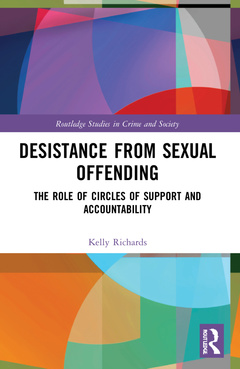Desistance from Sexual Offending The Role of Circles of Support and Accountability Routledge Studies in Crime and Society Series
Auteur : Richards Kelly

This book explores how Circles of Support and Accountability can reduce sexual reoffending. The release of a notorious sex offender from prison strikes fear into members of the public. Media coverage often provokes further panic, casting such offenders as irredeemable monsters and ticking time bombs, destined to continue preying on innocent children and women. In the West, governments have responded by enacting heavily punitive and exclusionary policies, such as public sex offender registers, indefinite detention, and lifetime correctional supervision.
A radically different approach ? Circles of Support and Accountability (CoSA) ? emerged alongside these measures. CoSA are groups of trained volunteers who collectively resist the exclusionary impulse, instead actively supporting those with sexual offence convictions to reintegrate into communities. Despite their seemingly counterintuitive nature, the research is clear that CoSA reduce sexual reoffending far better than more popular draconian sex offender management policies. However, little is understood about how CoSA work.
This book begins to address this gap by proposing a new way of understanding how CoSA reduce sexual reoffending. Drawing on 65 in-depth interviews with CoSA participants, it offers a new theoretically-informed empirical explanation of CoSA?s capacity to promote desistance from sexual offending, and to turn those convicted of sexual offenders into law-abiding and productive members of the community. Ultimately it is a call to action, demonstrating that we, the community, must play a more central role in integrating people with sexual offence convictions if we desire safer communities for our children and our selves. This work illuminates new directions for research, policy, and practice, and is essential reading for academics and students engaged in the study of criminology and criminal justice, restorative justice, sexual violence, and reentry
Introduction
Chapter 1. Situating Circles of Support and Accountability Chapter 2. Theorising Circles of Support and Accountability Chapter 3. Researching Circles of Support and Accountability Chapter 4. A Shot at Redemption: Circles of Support and Accountability, Desistance and Redemption Scripts Chapter 5. Circles of Support and Accountability, the 110-Percenters and Witnesses to Identity TransformationChapter 6. Giving Back from a Hopeless Place: Circles of Support and Accountability and Generativity Chapter 7. Circles of Support and Accountability and Core Members as Wounded HealersChapter 8. Implications for Practice: Delivering Circles of Support and Accountability as Desistance-Promotion Conclusion
Kelly Richards holds a PhD in criminology from Western Sydney University. She is currently an Associate Professor in the School of Justice at Queensland University of Technology, where her research focuses primarily on those who perpetrate sexual violence. In 2010, she was awarded the ACT Government Office for Women Audrey Fagan Churchill Fellowship to investigate Circles of Support and Accountability in Canada, America and the United Kingdom. She was recently awarded a Fulbright Senior Scholar Award and will use this to further her research at California State University and the University of Vermont. She lives in Brisbane with her husband and Staghound X, and enjoys hiking, music and pub trivia.
Date de parution : 05-2023
15.2x22.9 cm
Date de parution : 12-2021
15.2x22.9 cm
Thèmes de Desistance from Sexual Offending :
Mots-clés :
Core Members; Desistance; Sex Offenders; desistance from sexual offending; Redemption Scripts; Circles of Support and Accountability; Sexual Offence; CoSA; Restorative Justice; reintegration; Circle Volunteers; sexual violence; Young Men; sexual abuse; Follow; child sexual abuse; Good Life; RNR Model; Churchill Fellowship; Lower Risk Offenders; Reintegrative Shaming; Holding; Primary Human Goods; Sexual Offence Histories; Circles South East; Sexual Recidivism; Responsivity Model; Circle Coordinator; Desistance Journeys; Sexual Reoffending; Warrant Expiry Date; Practice Suggestions



